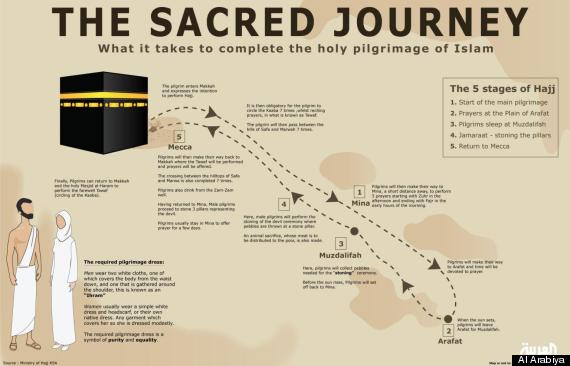What is Hajj?
The annual Hajj pilgrimage is one of the world's largest gatherings, as hundreds of thousands of people flock to Mecca, Saudi Arabia, to participate in one of Islam's five pillars of faith. Muslims from all over the world will gather together for five days to pray as one community, celebrating their history and giving thanks for blessings. From the Masjid Al Haram complex to the hills of Mina, the rites include circling the Kaaba seven times and visiting sites of historical and religious importance.
When is Hajj 2013?
This year's hajj will be celebrated on Oct. 13th to 18th, though that date depends on the sighting of the moon, as Islam follows a lunar calendar. Hajj takes place annually on the eighth day of the month of Dhul Al-Hijjah in the Muslim calendar. It's considered an obligation for devout Muslims to undertake the pilgrimage to Mecca at least once in their lifetime, if they are physically and financially able.
What's the history of Hajj?
The pilgrimage to Mecca has been going on since pre-Islamic times, as Mecca's economic prosperity during the time of the Prophet Muhammad was largely due to the income from visitors.
Muslims believe that the steps of the Hajj correlate to the story of Hagar, the second wife of Abraham whom he married after Sarah was childless. After Abraham left her and her infant son, Ishmael, in the desert, she frantically ran between the hills of Safa and Marwa to look for food and water for her baby after their provisions ran out. As she prayed to God for mercy, Ishmael's heel hit the ground and the well of Zam Zam sprang forth to nourish them. When Abraham returned, he built the Kaaba with Ishmael's help.
What are the steps of Hajj?
First, pilgrims go to Miqat, the entry station to the Hajj, where they bathe, put on special clothing, and make a formal statement of intent. Next they enter the Masjid al Haram complex to do Tawaf, a rite which involves circling the Kaaba seven times while reciting prayers. After this takes place, it's encouraged to sip water from the Zam Zam well, then walk between the hills of Safa and Marwa seven times.
Next, the formal Hajj ritual begins with another declaration of intent. Pilgrims then travel to Mina on the 8th of Dhul al Hijjah and stay there until dawn prayer the next morning. Following the prayer, the faithful travel to the valley of Arafat to stand in the heat and praise God. The day concludes with travel to Muzdalifa and the gathering of small pebbles. A symbolic stoning of the devil occurs at Mina the next day, along with the animal sacrifice which is part of Eid al Adha. Male pilgrims will shave their heads after this occurs. Next, pilgrims return to Mecca to do the Tawaf again, along with the crossing between Safa and Marwa 7 times. Another trip to Mina then takes place, along with more symbolic stoning, before the faithful can return to Mecca to do a farewell Tawaf.
What are other rituals associated with Hajj?
Pilgrims perform the Hajj in a state of ritual purity called ihram, which for men is physically represented by wearing simple garments made of unsewn cloth. It demonstrates the equality of humanity before God.
How many people go on Hajj?
In 2012, Al Arabiya reports that 3,161,573 went on Hajj, with 1,700,000 of them coming from outside of Saudi Arabia.
What is Eid al-Adha?
The Eid of the sacrifice takes place on the 10th day of Dhul Al-Hijjah, or Oct. 15, which commemorates Abraham's willingness to sacrifice his son Ishmael in order to be totally obedient to God. Muslims sacrifice a goat or lamb in remembrance of this act of faith and give part of the meat to the poor.
